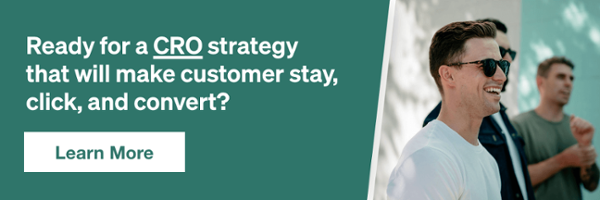Imagine you’re a grocery store trying to promote healthy eating, so you invest money on these big luscious produce displays, full of nutritional leafy goodness. People are pouring in the door to look at your beautiful vegetables. But that’s all they do, walk in and stare at a pile of Broccoli and then leave — they’re not actually purchasing goods.
This is why internet based companies and almost every modern digital marketing agency focus on CRO. CRO stands for Conversion Rate Optimization. What’s the rate of visitors who are converted into paying customers? Are people who come to our website driving revenue growth, or are they just window shopping? Companies invest time in CRO marketing because they want to have reassurance that their dollars and strategies are actually increasing sales.
And although most companies focus on sales, leads are an equally important type of conversion — creating an account, email subscription, download, survey, or free trial sign-up. Depending on your specific business needs, a conversion could be seen as any customer action that you can measure using analytic tools like Google Analytics.
Why CRO Is a Game-Changer for Your Business
Many brands make the mistake of chasing more traffic instead of optimizing their existing audience. A strong CRO strategy provides powerful benefits beyond just boosting conversions.
1. Improved Customer Insights
By analyzing and monitoring conversion data, you gain a better understanding of customer behavior, allowing you to refine messaging, content, and site structure to align with what users truly want.
2. Enhanced User Experience (UX)
CRO isn’t just about numbers—it’s about creating a frictionless experience. When users can navigate your site easily, they’re more likely to convert.
3. Higher ROI Without More Ad Spend
Optimizing your existing traffic means increasing revenue without increasing marketing costs. CRO makes every visitor more valuable, improving ROI across all digital channels.
Top CRO Strategies to Drive More Conversions
So how do you actually accomplish all this? Well, internet marketers try to increase conversions in a number of ways. It comes down to assessing the way people behave online and then altering elements of design, visual communication, copywriting, and usability to meet their needs. Experimenting with different versions of your website helps you tap into the psychology of your customers, which is the gateway to revenue generation. Below are 12 tips and techniques to help you improve CROs in 2025.
Find quality customers
You want to attract customers who have some sort of personal investment in your product. If their lifestyle and/or habits fit your company they’ll be more likely to spread the word and become repeat customers. CRO strategy is not about getting anyone and everyone to your site, it’s about getting the right customers.
The 3 R’s: Research, research, research
Conversion guru Michael Aagaard preaches the importance of endless research before you even set out to improve your CRO — “Conducting Conversion Research is my equivalent of sharpening an axe. I want to increase my chances of chopping down the tree in the first attempt, rather than hacking away blindly till I randomly hit something.” Research means understanding a lot of analytics: high traffic sources, competitor practices, landing page design practices, source of organic traffic, visual communication, copywriting effectiveness, and much more. Here are several conversion tool services that can help you out.
Conversion funnel
Your conversion funnel is the path that your customers take from initial contact all the way to purchase. Website visitors start with a lot of choices, but with guidance they end up at a single point. Finely tuning your conversion funnel can be complex — it involves determining which sequential steps make the most sense for your business.
Related: 9 CRO Facts That Will Convince You to Use It [VIDEO]
You want to pull your customers through the buying process by understanding their experience at each stage and what they need to move to the next. Example: if a customer is in the shopping cart stage and they go to checkout, but suddenly the process becomes complicated, you’re going to notice a lot of abandoned carts. In this instance, adding something simple like one-page checkouts, could be the adjustment your conversion funnel needs to provide the user with easy options to purchase.
A/B split testing
A simple yet effective testing method: Make a duplicate of one of your pages, but alter one of the elements. Direct half of your visitors to Page A and half to Page B. Analyze the results after a sufficient amount of time. Whichever page performs better is the one you keep. This is an essential step in achieving sustainable growth. The best part is you can repeat this split testing for as many variables as you want, in all channels of your business.
Related: The Connection Between User Experience (UX) and Search Engine Optimization
Multivariate testing
A method of testing the arrangements of your page elements. It’s done by pairing different variations of pictures, videos, calls to action and copy and then determining which variations perform the best together. Depending on how many variables you choose to work with, it can create a lot of data, which is a good thing. For this reason multivariate testing is usually only recommended for higher volume businesses.
Call to action
Having a call to action on multiple pages is important for any website, but there are slight tweaks you can apply that will increase your visitor engagement. The idea is to eliminate the unknown — customers feel more comfortable clicking a call to action when they know what to expect. For example, if you were a health food retailer, instead of your button reading, “Buy Now”, it would be more revealing to say, “Buy Now & Get Healthy.” It should go without saying, but make sure your call-to-action is in the style of a button and not just text, or it may go unnoticed.Knowing how to write a call to action that converts will help propel your brand forward and lead to success.
Break down your target audience
Once you’ve gathered some data on your major demographics it’s crucial to create some individual profiles based on their behaviors and habits. Who are they? Where do they live? Occupation? Single/married? Once you’ve answered these questions you can start to piece together a storyboard of their potential buying process — it’s called customer journey mapping.
Related: How to Deliver Value at Every Stage of the Customer Journey
You follow their path from brand awareness to engagement to purchase and onto return customer or ambassador. Here’s a very informative article on customer journey mapping.
Stock photos are out
The internet has been around a long time and people are savvy to all its tricks. It’s obvious to consumers when they’re looking at a stock photo. Don’t over do it with artistically framed pictures of tall buildings, it’s more important to show your human side. Visitors are more likely to relate to a company if they can peak behind the curtain — images of real employees and company culture is a much more social way to engage with your customers.
Clear headlines
Don’t underestimate the value of a good headline. There’s a huge tendency for copywriters and marketers to be coy with their words. But customers don’t have time to read between the lines, they came to your website to know what you’re all about, so be clear right off the bat. Check out this article on A/B headline testing, which can help you improve your headline writing.
Display contact information
Have you ever gone to make an online purchase but noticed that the company’s contact information is nowhere to be found, and suddenly it all seems kind of sketchy? Customers are less likely to convert if contact information is scarce or hard to find. A good way to avoid this is by displaying your phone number prominently on your homepage and making your company address easily accessible.
Display your competitive edge
Take a look at your competitors and identify what you offer that they don’t. Display this competitive edge prominently so that your customers see your unique value. For example, healthy ice cream is a growing fad, and Halo Top’s landing page does a good job displaying what sets them apart from fitness forward desserts.
Figuring out what doesn’t work
It’s great when data comes back positive after making a significant change. But, it’s just as important to analyze and answer questions about the areas where you’re struggling. Why didn’t that lead to a conversion? Why are people leaving the site on this page? If you can interpret what causes high exit and bounce rates (the amount of visitors who leave), you’ll be able to avoid similar mistakes in the future.
The Role of Analytics in CRO Success
You can’t optimize what you don’t measure. Tracking and analyzing user behavior is critical to improving conversion rates.
How to Track CRO Performance:
- Google Analytics – Identify drop-off points and user flow.
- Heatmaps (Hotjar, Crazy Egg) – See where users click and scroll.
- Session Recordings – Watch real user interactions to spot friction points.
- A/B Testing Tools (Optimizely, VWO) – Compare variations of pages to determine the best performers.
Final Thoughts: CRO is an Ongoing Process
Conversion Rate Optimization isn’t a one-and-done tactic—it’s a continuous process of testing, refining, and improving. By implementing these strategies, measuring results, and adapting based on data, your brand can maximize every website visitor and achieve long-term growth.
Overall, CRO is a method to motivate your customers down the digital yellow brick road, all the way to Emerald City, and by Emerald City I mean conversion. Because, at the end of the day what companies are really after is driving more engagement and revenue growth, and CRO is a powerful tool for doing just that.
Related: The Ultimate Guide to Hiring a CRO Agency
Ushering visitors through your digital business is a calculated process. Each web page has to make sense and build upon the last. The journey of a buyer is fueled by their needs and your company’s ability to meet those needs at every turn.
Of course, you won’t get very far without research. Research should be a never ending pencil that you can continue to sharpen. The information you gather from research will inform your most impactful CRO related decisions. Research is so important, you may want to research, research.
Need expert guidance to optimize your website for higher conversions? Contact Power Digital Marketing today and let’s turn traffic into revenue!








